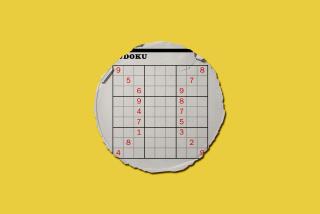The man behind those maddening numbers
- Share via
WASHINGON — And now, some numbers for Maki Kaji, the man who helped invent Sudoku:
* 1984 -- year he created the puzzle, which was based on an American game called Numbers Place.
* 35 -- seconds it took for him to come up with the game’s Japanese name (“su” means number; “doku” means single).
* 0 -- trademarks that Kaji secured before his game was reproduced around the world.
“Some friends said, ‘Maki, you should have trademarked Sudoku. You could have been a millionaire,’ ” Kaji told a crowd of about 50 during a recent appearance at the Sakura Matsuri Japanese Street Festival in Washington. “I said: ‘No, that’s not what I want. I’m happy to see everyone enjoy Sudoku more easily.’ ”
Not to worry. Kaji, 57, who owns a puzzle company called Nikoli, is doing just fine: He’s publishing new games, traveling the world to promote them and feeling the love from Sudoku devotees. When Kaji left the stage here to pass out brochures, he was mobbed by fans.
The game, for the few who might not have tried it, involves ordering the numbers 1 through 9 in nine boxes of nine squares, with each column having all nine numbers vertically and horizontally. Howard Garns, an American architect, is credited with inventing the basic concept in 1979, calling it Numbers Place.
Much like the New York Times crossword puzzle, Sudoku games range from easy to difficult.
Lisa Lawler, 43, a Census Bureau employee, and Mariyam Al-Shatti, 18, a student at Montgomery College in Maryland, thrust Sudoku books in Kaji’s face and asked for autographs.
“My sister just loves the game. I just play a little, but I admire her because she’s so good,” Lawler said, thanking Kaji with an “arigato” and bowing. Al-Shatti eagerly volunteered to compete in one of the two Sudoku contests.
They were won by Heidi Lee, 27, a painter from Manhattan, and Brandon Bear, 21, a college senior from York, Pa., who finished the puzzles in about five minutes.
“I used to play a lot,” Lee said. “But I don’t have too much time.”
Kaji also appreciated the symmetry in Garns’ game and decided to introduce a version in Japan, but “the name did not hit me.” With his staff urging a new name and Kaji eager to move on to something else, he blurted out, “Suuji wa dokushin ni kagiru,” which meant that the numbers should go in single boxes, like the unmarried. The name was later shortened to Sudoku.
“I was already married,” he told the crowd, “so please understand that I did not come up with the name because I wanted to be single again!”
Kaji might not be a millionaire, but he maintains his sense of humor.
How often does he play Sudoku?
“Only on the plane,” he said.
What are his new favorites?
Nurikabe and Slitherlink, both number games that his company is marketing, of course.
Is there a difference between Japanese and American players?
Not on the advanced level, Kaji said. But on the general level, Americans tend to fill in the boxes with pencil and make lots of changes before finishing, he said. And according to Kaji, the Japanese think about everything for a long time before writing down their answers just once.

